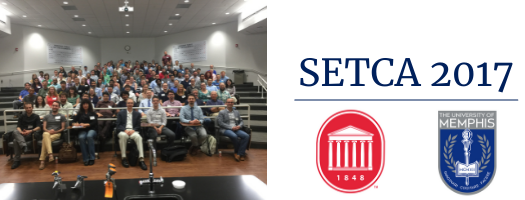Location
Coulter Hall, Room 211
Start Date
19-5-2017 9:50 AM
End Date
18-5-2017 9:50 AM
Description
We have recently demonstrated that it is possible to combine conventional Quantum Chemistry many-body approaches with flow renormalization group methods to produce a new family of electronic structure theories. These methods have several advantages: (i) they are numerically-robust and avoid intruder states, (ii) they lead to equation that are relatively simple, and (iii) they are easily generalized to multi-determinantal reference states. An important aspect of our work has been to reformulate the similarity renormalization group (SRG) of Głazek and Wilson and Wegner [1,2] into a practical quantum chemistry approach, the driven SRG (DSRG) [3]. Recently, we examined new approximation schemes for the DSRG that are both accurate and economical. This talk will focus on second- and third-order perturbative approximations of the DSRG [4,5] equations and their generalization to treat near-degenerate ground and excited states.
- Francesco A. Evangelista, Emory University
- Chenyang Li, Emory University
- Kevin P. Hannon, Emory University
- Prakash Verma, Emory University
Relational Format
Conference proceeding
Recommended Citation
Evangelista, Francesco A., "IL3. Electron correlation methods for near-degenerate electronic states based on the driven similarity renormalization group" (2017). Southeast Theoretical Chemistry Association Meeting (SETCA). 7.
https://egrove.olemiss.edu/setca/2017/schedule/7
IL3. Electron correlation methods for near-degenerate electronic states based on the driven similarity renormalization group
Coulter Hall, Room 211
We have recently demonstrated that it is possible to combine conventional Quantum Chemistry many-body approaches with flow renormalization group methods to produce a new family of electronic structure theories. These methods have several advantages: (i) they are numerically-robust and avoid intruder states, (ii) they lead to equation that are relatively simple, and (iii) they are easily generalized to multi-determinantal reference states. An important aspect of our work has been to reformulate the similarity renormalization group (SRG) of Głazek and Wilson and Wegner [1,2] into a practical quantum chemistry approach, the driven SRG (DSRG) [3]. Recently, we examined new approximation schemes for the DSRG that are both accurate and economical. This talk will focus on second- and third-order perturbative approximations of the DSRG [4,5] equations and their generalization to treat near-degenerate ground and excited states.
- Francesco A. Evangelista, Emory University
- Chenyang Li, Emory University
- Kevin P. Hannon, Emory University
- Prakash Verma, Emory University



Comments
Download includes an expanded abstract with collaborators, institutional affiliations and cited references.